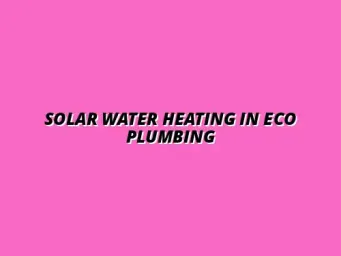The Significance of Solar Water Heating in Eco Plumbing Systems
The world is changing, and so are our plumbing systems! Solar water heating plays a crucial role in eco plumbing, helping us save energy and protect our environment. By utilizing the sun’s energy, we can not only reduce our utility bills but also contribute to a more sustainable future.
Understanding Eco Plumbing Systems and Their Benefits
Defining Eco Plumbing Systems: Sustainable Solutions for Modern Homes
Eco plumbing systems focus on using environmentally friendly practices to manage water and energy in our homes. These systems include features like rainwater harvesting, greywater recycling, and of course, solar water heating. By integrating these solutions, we can create a more sustainable living space that is kind to our planet. Learn more about the eco-friendly plumbing benefits for homeowners and how they can positively impact your home.
In essence, eco plumbing systems aim to reduce overall water and energy consumption. This is not just about immediate savings; it's about ensuring that future generations can enjoy clean water and a healthy environment. Through innovative practices, we can lead the way to a greener future!
Key Benefits of Eco Plumbing Systems: Efficiency, Cost Savings, and Environmental Impact
There are several significant benefits to adopting eco plumbing systems in our homes:
- Energy Efficiency: Eco plumbing reduces energy use, which not only lowers bills but also conserves natural resources.
- Cost Savings: Over time, the initial investment in eco plumbing pays off through reduced utility costs.
- Environmental Protection: These systems help decrease our carbon footprint and protect local ecosystems.
By understanding these benefits, homeowners can make informed decisions that align with their values and goals. Investing in eco plumbing means investing in a sustainable future for all! For example, implementing simple water-saving tips for your home can drastically reduce your water usage and bills.
The Fundamentals of Solar Water Heating Technology
How Solar Water Heating Works: The Science Behind the Technology
Solar water heating systems capture sunlight to heat water, which can then be used for various household purposes. They typically consist of solar collectors, a storage tank, and a circulation system. When sunlight hits the solar collectors, it warms a fluid that transfers heat to the water in the tank.
This technology is efficient and can provide a significant portion of a home’s hot water needs. By harnessing the sun’s energy, we can enjoy hot showers and clean laundry without heavily relying on fossil fuels!
Different Types of Solar Water Heating Systems: Active vs. Passive Systems
Solar water heating systems can be categorized into two main types:
- Active Systems: These systems use pumps and controls to circulate water or heat transfer fluids. They are typically more efficient and can provide hot water even on cloudy days.
- Passive Systems: Passive systems rely on gravity and natural convection to circulate water. They are simpler and generally less expensive but may not be as efficient as active systems.
Choosing between these systems depends on factors such as location, budget, and hot water needs. Understanding these differences can help you select the best solar water heating option for your home! Regular maintenance can extend the life of your water heater, regardless of the type.
Common Misconceptions About Solar Water Heating Systems
When it comes to solar water heating, there are a lot of myths floating around. Some people think these systems only work well in sunny climates, while others are unsure if the installation costs are worth it. It's essential to address these misconceptions to help homeowners make informed decisions about integrating solar water heating into their eco plumbing systems.
One common misunderstanding is that solar water heating systems are ineffective in less-than-ideal weather. In reality, they can still perform well, even in cooler climates! Let's dive deeper into some of these myths and clarify what solar water heating can really do.
Debunking Myths: Solar Water Heating is Not Just for Warm Climates
Many believe that solar water heating systems only thrive in sunny areas. However, these systems can operate efficiently in a range of weather conditions. They utilize direct sunlight, but they can also absorb diffuse sunlight, which occurs on cloudy days.
Here are a few factors that influence solar water heating performance:
- Geographical location: Systems can be effective in various climates, not just tropical ones.
- Collector orientation: Properly positioned solar collectors can capture more sunlight, even in the winter.
- Insulation: Adding insulation can help maintain water temperature, ensuring efficiency year-round.
Understanding Performance in Different Weather Conditions
It’s a common misconception that cold weather limits the performance of solar water heating systems. Instead, these systems can still provide hot water during the colder months! The key lies in their design and configuration.
Factors to consider for performance in various weather conditions include:
- Type of solar collectors: Some are better suited for colder climates.
- Storage tank capacity: Larger tanks can hold more hot water, which is beneficial in winter.
- Backup systems: Some systems have built-in heaters for cloudy days.
Addressing Installation Costs: Is It Worth the Investment?
Many people hesitate to invest in solar water heating due to perceived high installation costs. However, it’s essential to look at the long-term benefits and returns on this investment. While the initial costs may seem daunting, the savings on energy bills can add up over time!
Here are a few factors that can help you assess whether solar water heating is worth it:
- Energy savings: Reduced utility bills can lead to significant savings over the years.
- Incentives: Many governments offer rebates or tax credits for installing solar systems.
- Increased home value: Eco-friendly upgrades can enhance property value.
Frequently Asked Questions About Solar Water Heating in Eco Plumbing
As solar water heating becomes more popular, many people have questions about its practicality and effectiveness. Understanding these common queries can help homeowners feel more confident in their decisions. Let’s tackle some of the frequently asked questions!
Addressing these questions can help clear up any confusion and encourage the adoption of eco plumbing systems that include solar water heating. For example, ensuring proper drain cleaning is a crucial part of maintaining efficient plumbing systems.
How Much Can You Save With Solar Water Heating?
One of the most frequently asked questions is about the potential savings associated with solar water heating. The amount you save can depend on several factors, including your location and how much hot water your household uses.
Generally, homeowners can expect to save:
- 30-50%: Reduction in water heating costs.
- Long-term impact: Significant savings over the lifespan of the system.
- Variables: Total savings may vary based on energy prices and usage habits.
What Maintenance is Required for Solar Water Heating Systems?
Another common question revolves around the maintenance of solar water heating systems. While these systems are generally low-maintenance, some upkeep is necessary to ensure optimal performance. Regular maintenance can extend the life of the system and improve efficiency. Similar maintenance is important for your bathroom plumbing; check out these bathroom drain maintenance tips.
Key maintenance tasks include:
- Annual inspections: Check for any leaks or damage.
- Cleaning collectors: Ensure that solar panels are free of debris.
- Monitoring system performance: Regularly check to make sure the system is functioning properly.
Future Trends in Solar Water Heating and Eco Plumbing
The future of solar water heating and eco plumbing systems looks promising! With ongoing innovations and advancements, we can expect to see exciting developments that enhance efficiency and usability. Let's explore what the future holds for these sustainable solutions. Consider contacting a local plumber, such as a plumber in Billesley, Birmingham, for expert advice on your eco-plumbing needs. Remember that implementing green plumbing for water savings is a long-term investment in sustainability.









